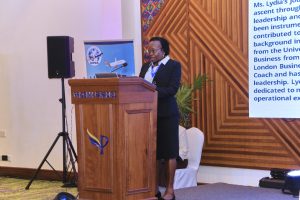Reparative Justice: A Call for Comprehensive Transformation, Not Just Compensation

By Baboloki Semele: At the 46th Ordinary Session of the Executive Council of the African Union (AU), under the theme “Justice for Africans and People of African Descent Through Reparations,” Mr. Claver Gatete, the Executive Secretary of the United Nations Economic Commission for Africa (ECA), addressed a critical issue that continues to shape Africa’s future – reparative justice. His statement not only underscored the importance of seeking justice for Africa’s painful history but also called for a multi-dimensional approach that goes beyond financial compensation.
In his remarks, Gatete expressed deep gratitude to the African Union Commission for prioritizing the theme of reparations in 2025, highlighting the significance of the decision to place reparative justice at the center of Africa’s collective agenda. He also commended AU Chairperson H.E. Moussa Faki Mahamat for his leadership and acknowledged the commitment of Heads of State and Government to launch reparations initiatives in their respective countries. This unity, Gatete noted, was a significant step toward addressing the systemic injustices inflicted on Africa and its diaspora through centuries of exploitation and oppression.
The Historical Context: A Legacy of Loss
Gatete began his address by acknowledging the brutal legacy of the transatlantic slave trade and colonial exploitation, which he said, robbed Africa of its people, resources, and dignity. These historical wrongs, according to Gatete, continue to resonate today, manifesting as stark inequalities in global financial systems, trade structures, and governance institutions that still hold back Africa’s progress.
One of the most telling disparities he highlighted was Africa’s economic paradox: while the continent is home to 30% of the world’s mineral reserves, 65% of its arable land, and the majority of its valuable natural resources, it accounts for less than 3% of global trade and only 1% of global manufacturing output. These statistics underscore the persistent structural barriers that prevent Africa from reaching its economic potential, a result of historical exploitation that continues to stymie the continent’s growth.
Beyond Financial Compensation: A Comprehensive Approach to Reparative Justice
In his call for reparative justice, Gatete emphasized that the injustices of the past cannot be remedied through financial compensation alone. He argued that reparative justice must be comprehensive, addressing the systemic barriers that continue to hinder Africa’s development.
Gatete proposed five key areas for action that would help translate the call for reparative justice into tangible outcomes:
- Reforming the Global Financial Architecture: The current global financial system, Gatete argued, is inequitable and outdated. He called for reforms to ensure that African nations are fairly represented in global economic decision-making processes. This includes advocating for debt restructuring that allows African nations to invest in their people and infrastructure rather than continue to pay excessive interest rates on debt.
- Harnessing the African Continental Free Trade Area (AfCFTA): The AfCFTA, with its vast market of 1.5 billion people and a combined GDP of over US$ 3 trillion, presents an unprecedented opportunity to boost intra-African trade and industrialization. Gatete emphasized the need to leverage the AfCFTA to reduce Africa’s dependency on external markets and create regional value chains that will benefit African industries and workers.
- Value Addition on Africa’s Mineral Wealth: For centuries, Africa’s natural resources have been extracted and exported in raw form, benefiting others while leaving Africa impoverished. Gatete called for the prioritization of value addition within the continent, ensuring that Africa processes its minerals locally and creates jobs for its people, rather than exporting raw materials and re-importing finished goods at a higher cost.
- Building Partnerships with the African Diaspora: Gatete stressed the importance of recognizing the African diaspora as a key partner in Africa’s development. Through economic and cultural collaboration, the diaspora can contribute to Africa’s prosperity. Initiatives such as investment platforms and scholarship programs for descendants of enslaved Africans were among the suggestions made to foster these connections and rebuild ties that were severed by the transatlantic slave trade.
- Accelerating African Integration: Finally, Gatete underscored the need to implement the AU Protocol on Free Movement of Persons, which would facilitate greater mobility across the continent. This, he argued, would promote trade, knowledge transfer, cultural unity, and regional cooperation, all of which are critical to Africa’s future prosperity.
A Vision for Africa’s Future
Gatete concluded his address with a call for optimism and action, declaring that the injustices of the past must not dictate Africa’s future. He reiterated the ECA’s commitment to working alongside African nations to reclaim economic sovereignty and ensure that all Africans can live with dignity and prosperity. This is a critical moment, he said, to forge ahead with determination, to build a more just and equitable world for Africans both on the continent and in the diaspora.
As African nations continue to confront the enduring consequences of historical injustices, the theme of reparative justice has gained increasing traction. The call for a comprehensive, multifaceted approach is vital to addressing the root causes of Africa’s economic challenges, and the 46th Ordinary Session of the AU Executive Council has become a crucial platform to advance this discourse.
As Africa seeks to rewrite its economic narrative, Gatete’s powerful speech serves as a timely reminder that true reparative justice is not just about financial compensation—it is about dismantling the structural barriers that continue to hinder Africa’s growth and prosperity. Only then can the continent move beyond the shadows of its painful past and embrace a future of true economic independence and dignity.
About the United Nations Economic Commission for Africa
Established by the Economic and Social Council (ECOSOC) of the United Nations (UN) in 1958 as one of the UN’s five regional commissions, the United Nations Economic Commission for Africa’s (ECA’s) mandate is to promote the economic and social development of its Member States, foster intraregional integration and promote international cooperation for Africa’s development. ECA is made up of 54 Member States and plays a dual role as a regional arm of the UN and as a key component of the African institutional landscape.





